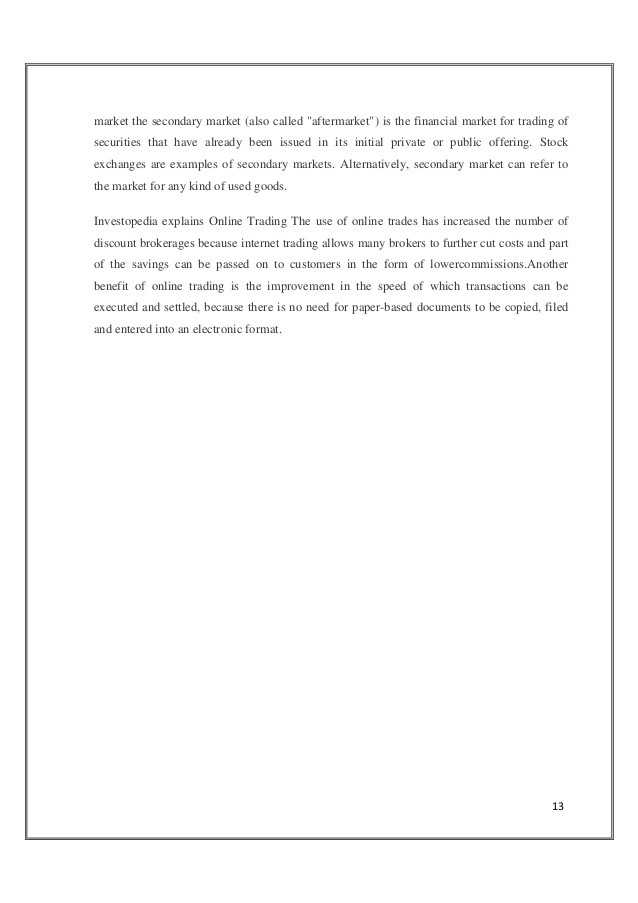Investor Alert Brokerage Firm Private Securities Offerings Buying Your Brokerage
Post on: 16 Март, 2015 No Comment

Protect Yourself
Brokerage Firm Private Securities Offerings: Buying Your Brokerage
To raise capital, brokerage firms sometimes sell their own or an affiliate’s securities. Such broker-dealer self-offerings (BDOs) can take the form of registered public offerings or private placements. This Alert addresses issues raised by a broker’s private placement of its own or its affiliate’s securities (private BDOs), particularly to firm customers.
While private BDOs can be legitimate investments, enforcement actions (see below) highlight the potential for abuse in private BDOs. Actions were brought against several individuals and firms that sold more than $36 million in private BDOs to investors that involved fraud or other serious misconduct. Some of these cases involved the use of high-pressure sales tactics targeted at elderly or retired investors.
We issued this Alert to help investors understand what private BDOs are, the risks involved with them, and how to identify the telltale signs of fraud or other misconduct.
What is a Private BDO?
The money that brokerage firms raise in private BDOs is usually used to finance their operations or those of an affiliate. When you invest in a private BDO, you are investing in the brokerage firm itself or its affiliate. As such, you share in the risks that the business will be unsuccessful or unprofitable or you could participate in successful operations of the firm or its affiliates when the increased value of the firm or affiliate’s equity is reflected in the value of its securities.
SEC rules place certain limitations on the way private BDOs and other private placements of securities can be sold to investors. Brokerage firms generally are not permitted to advertise the BDO and the number of small investors to whom the securities can be offered is usually limited. The securities sold in private BDOs are not registered with the SEC or filed with FINRA and they are not publicly traded. Private BDOs, therefore, are subject to significantly fewer disclosure requirements and less regulatory oversight than registered public offerings, and they are illiquid.
Why are Private BDOs Risky?
Investing in a private BDO can involve significant risk. And private BDOs that are publicized through spam emails or cold calling are often fraudulent or otherwise problematic. Before investing, consider the following:
- The Offering May Be Illegal Any company that offers or sells securities in a public offering must either register the securities with the SEC or meet one of the exemptions from registration. Otherwise the offering is illegal. Private BDOs may qualify for an SEC Regulation D exemption, which provides some of the most common exemptions from registration. But to meet these exemptions, the securities often cannot be advertised to the general public.
Red Flags that Could Signal Fraud
Regulatory investigations reveal patterns in the way problem private BDOs are promoted to investors:
- Cold-Calling or Spam. Brokers selling problem private BDOs often use unsolicited telephone calls or email to sell private BDOs. In one case, a firm obtained customer accounts from defunct brokerages and used the firms’ customer lists to identify potential victims.
Be advised: firms using these red-flagged tactics often provide little or no supervision of their sales people. Such firms may materially misrepresent management experience and other aspects of the company, omit information pertaining to disciplinary actions against the firm or individuals, and are in dire financial straits.
Protecting Yourself
The following steps will help protect you from making an investment decision you later regret:
1. Check out the brokerage firm, the broker, and other individuals before you invest. You can get information from the following sources:
- FINRA. Use FINRA BrokerCheck to make sure the brokerage firm and broker are properly registered and to research the disciplinary history of a firm or registered individual. Many of the individuals and firms involved in fraudulent BDOs have had run-ins with securities regulators. In one case, an individual involved in a private BDO had been barred from the securities industry.
To obtain a copy of these documents, contact the SEC’s Office of Public Reference as follows:
Office of Public Reference
100 F Street, NE
Washington, D.C. 20549-0102
Phone (202) 551-8090
Use the SEC documents to verify information that has been provided to you in connection with the BDO and to check on the financial condition of the brokerage firm or its affiliate.
- Your state securities regulator. Contact your state securities regulator to find out whether it has information about the company and the people behind it. Even if the firm may not have to register its securities with the SEC, it may have to register them with your state.
2. Ask your broker these questions
- How does this investment match my investment objectives? What is the risk that I could lose the money I invest?
Remember: Be skeptical. Verify any information you learn from your broker. Individuals and firms that promote fraudulent or problematic private BDOs may make false or misleading statements to lure you into making an investment.
3. Watch Out for Red Flags. If one of the red flags previously mentioned makes you suspicious about a BDO or if you think that the claims may be exaggerated or misleading, contact the FINRA Investor Complaint Center .
Additional Resources














